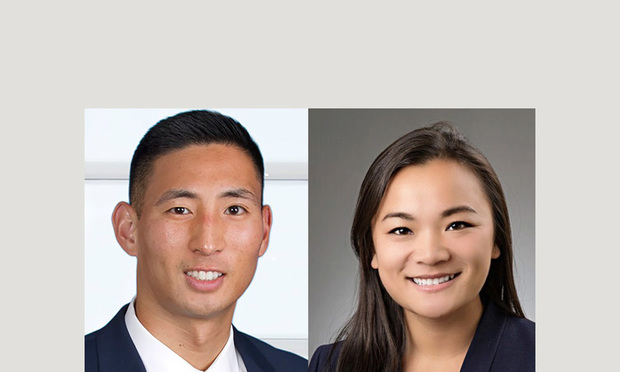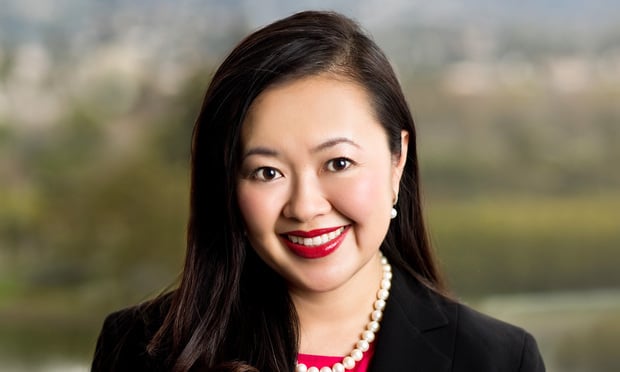 Dan Brody, an attorney with Robinson & Cole in Hartford, left, and Emily Covey, a law student at the University of Connecticut School of Law, right. Courtesy photos
Dan Brody, an attorney with Robinson & Cole in Hartford, left, and Emily Covey, a law student at the University of Connecticut School of Law, right. Courtesy photos
As University of Connecticut School of Law student Emily Covey prepares to graduate this spring and start her career in the Boston office of Hinckley, Allen & Snyder, she's also well aware of both subtle and outright aggression directed toward Asian Americans since the COVID-19 pandemic.
Study after study bears out what Covey has experienced walking down the street, in her apartment building and even in a parking lot: Asian Americans have a target on their back because the coronavirus pandemic originated in China.
DATA: Anti-Asian Hate Crime Reported to Police in America's Largest Cities: 2019 & 2020
For 28-year-old Covey, adopted from her native China by an American family, she says the incidents she endured are heartbreaking.
Recommended For You
One such encounter took place when Covey was leaving a West Hartford grocery store at the end of March 2020.
"A gentleman made eye contact with me, pointed his body at me and sprayed me with Lysol," she said. "He never said anything. I just walked away and tried to get into my car as soon as possible."
In a separate incident, Covey said a woman attempted to prevent her from entering a downtown Hartford apartment building, and yelled at the future lawyer, "Go away. You are making us sick."
But on other occasions, the aggression has been passive.
"Someone you pass on the street might tighten their mask around you. I see that happening a lot," Covey said.
Law Firms Denounce Rise in Violence, Harassment Toward Asian Americans
Don't 'make waves'
Robinson & Cole associate Dan Brody, who is Korean American, said Covey is among the few who are willing to open up about their experiences with racism and xenophobia.
"The underlying problem we see is that many don't want to speak out about such instances," said Brody, who is also president of the Connecticut Asian-Pacific American Bar Association. "The main reason is cultural. Some families do not want to speak out or make waves. It plays into this idea of Asians being the invisible minority—work hard and accomplish things, but do not protest and speak out."
Research shows that while discrimination against some groups is declining, the opposite is true for Asian Americans.
Across the country, violence has escalated, leading to a national "Stop the Hate" campaign on social media and other platforms. On March 16, a 21-year-old man went on a shooting spree at three Asian American-owned spas in the Atlanta area, leaving eight people dead, including six women of Asian descent.
A recent report from the Center for the Study of Hate and Extremism at California State University at San Bernadino shows hate crimes increased 145% against Asian Americans, while it generally dropped 6% nationally in 2020, based on police records in 16 of the country's largest cities.
And research also released this month from Stop AAPI (Asian American Pacific Islander) Hate shows that 3,795 incidents were reported over the course of about a year during the pandemic. But the group suspects the count is way higher, based on cultural and other reasons that prevent reporting.
 Quyen Ta of King & Spalding. Courtesy photo
Quyen Ta of King & Spalding. Courtesy photo Emboldened
Brody and others say comments from former President Donald Trump, who repeatedly called COVID-19 "the China virus" and once even echoed those in a crowd who called it the "Kung Flu," played a role in shaping some of the negative attitudes.
"To an extent, you can blame Trump," Brody said. "His rhetoric does not create hate and prejudice, but emboldens it. Those feelings and racism have always been there. It's allowed, though, to come and manifest itself publicly because some people aren't afraid to do certain things in public now."
Other lawyers made similar observations.
"There was an undercurrent of tension for a long time, and Trump's language made things worse," said Quyen Ta, an equity partner at King & Spalding in San Francisco. "It has definitely played on stereotypes."
Ta is the former president of the Vietnamese American Bar Association of Northern California and the regional governor of the Northern California region for the National Asian-American Pacific Bar Association. She called bigotry against Asian Americans "scary and real."
"People look at you and glare," she said. "There is that look, and it makes you feel very uncomfortable."
'Really difficult conversations'
But Brody and Ta share a sense of optimism, and a belief that things could improve with dialogue and communication.
To that end, Ta said King & Spalding's San Francisco office is set to convene a forum on bigotry against Asian Americans in the next few weeks.
"That will open the door to people talking with one another," she said. "It's a way of having really difficult conversations."
Elsewhere, the Connecticut Asian Pacific American Bar Association is set to sponsor a March 31 panel discussion on anti-Asian American discrimination.
"It will not look at just one angle," Brody said. "We will address the idea of our community being that invisible minority, and the rhetoric around what has been referred to as the Chinese Virus. … Maintaining dialogue and talking about issues [are] incredibly important, Only a movement creates change. Moments do nothing. That means we must acknowledge that these incidents have been happening during the pandemic. It's on us to use these moments to create a movement."
© 2025 ALM Global, LLC, All Rights Reserved. Request academic re-use from www.copyright.com. All other uses, submit a request to [email protected]. For more information visit Asset & Logo Licensing.








